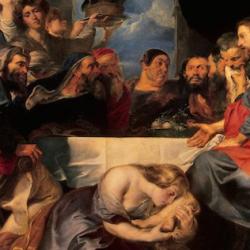The debates in Luke 20 are focused on the issue of leadership and authority. The basic question is, Who is going to set the direction for the future of Israel — Jesus and His followers, or the establishment. A number of things follow from this:
1) Jesus’ parable of the vineyard is directed against the leaders, not the people as a whole. In contrast to Isaiah 5, as Joel Green points out, the vineyard itself is not destroyed in Luke 20. It is intact, and handed over to other managers (the 12 initially — Jesus bequeaths a kingdom to them in Lk 22). This fulfills prophecy (eg Ezek 34), which foretells of a future when Israel will be governed by faithful shepherds. Also, it helps to explain how God keeps faith with Israel while at the same time destroying the temple. “All Israel” is saved in the first century, but the leadership of Israel is taken over by Jesus and His apostles. This needs to be qualified in all kinds of ways, but it’s a key part of the picture.
2) Practically, the debates help to clarify some of the things going on in the Reformed world these days, in relation to debates about, say, the Auburn Four or the New Perspective on Paul. I don’t mean to equate anyone in the Reformed world with the opponents of Jesus in the sense that I believe they are hypocrites or impious. That is far from the truth. But the struggle today is similar to the gospel debate over the future and direction of Israel, because it is a struggle over the future direction of the Reformed churches. And it is a struggle about who’s going to decide that future. This helps to explain why the debate can become nasty, why there is so much misunderstanding and innuendo, why apparently “minor” issues trigger major reactions. Perhaps we can’t all just get along and live together.
The other analogy that I see is this: On the one side, you have most of the big names in the Reformed world and the major seminaries, while on the other side you have a ragtag collection of autodidacts from places like Grande Prairie, Alberta, Moscow, Idaho, and Monroe, Louisiana. Again, with no implication at all about the sincerity of those who oppose the Auburn Four, it is simply the case that they hold the stronger position institutionally than the Auburn Avenue group. And if the struggle really is about the direction of the Reformed churches, it is a struggle about the direction of those institutions. In short, there is a whole lot at stake.
This is as much a challenge to those (like me) who support the Auburn Avenue side of the debate as it is to our opponents; we need to realize the stakes, admit to ourselves and our opponents what’s really going on, and not be surprised when our opponents come out with the big guns.















